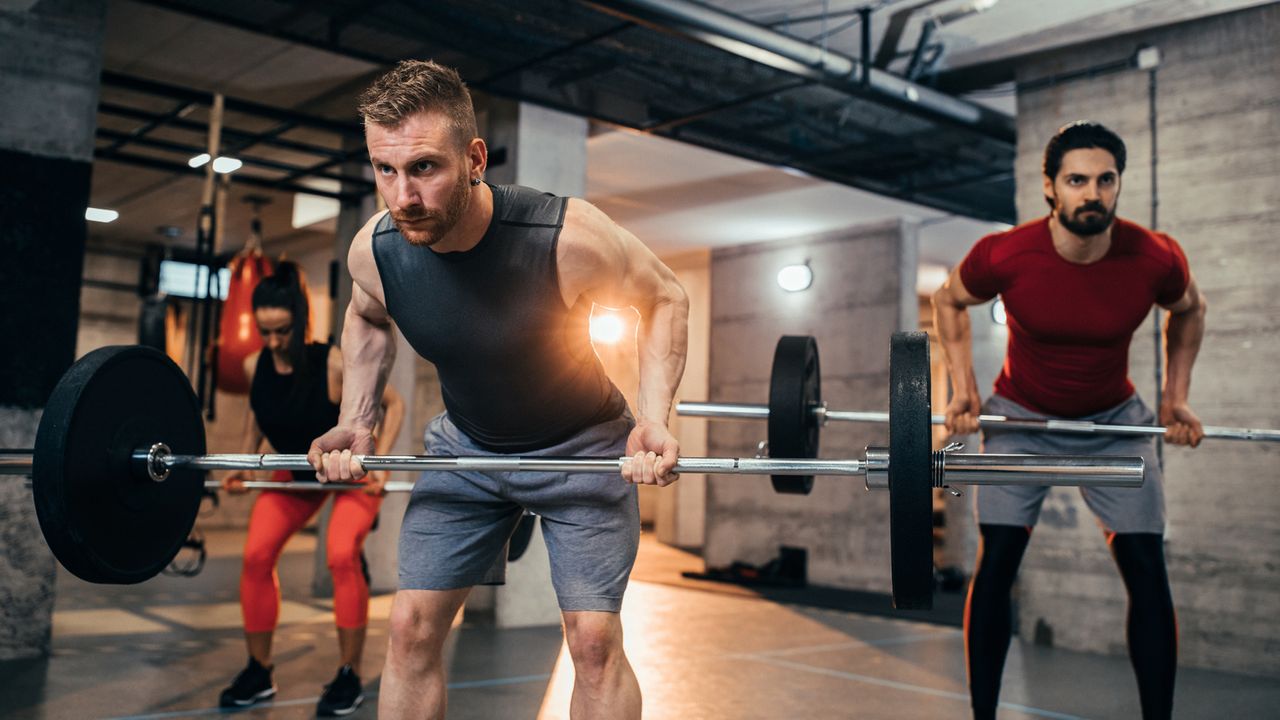

It is very beneficial to learn how to do barbell rows the right way if you want to get fit in 2020. By doing barbell rows – a.k.a. bent over rows – correctly, you can reap the benefits of this excellent compound exercise sooner: namely building big lats – the big muscles on your back that gives people that lovely V-shape. You can use it to get big arms as well – this exercise works your biceps – but mainly it is one of the best back exercises.
The bent over row can be performed with a barbell, dumbbells or, if you have some laying around at home or in the gym, kettlebells. Being a compound exercise, the barbell rows works a range of muscles and therefore burn more calories than just doing barbell curls or machine isolation exercises.
As for muscles worked, barbell rows mainly work your lats and your biceps, as well as your rear delt (the back of the shoulder) and upper back muscles (the muscles around your spine at the base of your neck). It also works the hamstrings and your core (you have to stabilise yourself, after all).
For being such an excellent compound exercise, we included barbell rows in the our ultimate full body workout routine: it's one of the Big 5s, five exercise that can give you a whole body blast and quick gains.
You can't be careful enough
Although barbell rows are probably the only exercise among the BIG 5 that doesn't involve you potentially crushing yourself under immense amount of weights, it is still advised to be extra cautious when you perform them.
It you are using a barbell, secure the plates on both ends with fasteners and check your surrounding before you start pulling up the bar.
As always, probably the best way to avoid injury is to get a training buddy. They can keep an eye on you while you perform your sets. Not only that, but having someone to train with you is also a great way to keep you motivated and stay on track with your gym routine.
Sign up to the T3 newsletter for smarter living straight to your inbox
Get all the latest news, reviews, deals and buying guides on gorgeous tech, home and active products from the T3 experts
And always, always warm up before exercising and make sure you don't push your muscles too much. Rest is equally as important as the exercise itself.
Join PureGym today | Low prices | Over 250 gyms across the UK | No contract
Thinking about joining the gym? PureGym has over 250 units all across the UK and you won't need a contact either when you sign up – leave anytime if you change your mind. Students save even more on fixed term memberships: up to 30% off. Find your nearest gym by clicking on the button below.
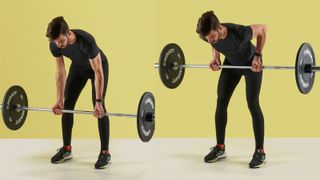
Keep your back straight and use underhand grip to hold the barbell
How to do barbell rows
To perform a standing barbell row, start off with your legs slightly more than shoulder width apart, barbell loaded (plates secured, surroundings checked) and resting on the floor in front of your legs. Bend over and pick the bar up using an underhand grip.
The starting position is you being bent over as far over as you can comfortably go without stretching your hamstrings too much. Bend your knees ever so slightly so your legs aren't locked. Your arms are extended and your shoulders are open, back straight and not arched. Core engaged.
When you pull the barbell, make sure you pull it towards your belly and not your chest. Keep your core engaged and try not to swing back and forth as perform the exercise. Your shoulders stay open, don't drop them even when the barbell is in the lowermost position.
If you are in the gym, it might help to do some reps with an unloaded barbell and watch your form in the mirror. There is no shame trying to perfect your form, you won't impress anyone performing exercises with a bad form and injuring yourself.
Barbell rows: variations and alternatives
We'll get around covering these soon.
- Dumbbell rows
- One-arm dumbbell row (great for beginners)
- Chest supported barbell row (you'll need a bench for this)
- T-bar rows (if you are a bit more experienced)
- Inverted row (bodyweight alternative)
On recovery and nutrition
To avoid any injuries and to help recovery, stretch after every strength training session (and after every cardio sessions as well). Foam rollers can be found in most gyms and you can buy them on Amazon too, a quick and inexpensive way to massage the tired muscles.
Resistance bands are not only great for workouts but they are also an effective way to stretch your hamstrings after you did your squats.
You might want to keep an eye out for your protein intake as well. If you are doing strength training, try taking in around 2 grams of protein for each kilogram of body weight per day. So, if you weigh 70 kg, you'll need to eat 140 grams of protein per day. Humans haven't got protein reserves, so you have to continuously take protein in throughout the day.
And make sure you drink plenty of water as well. A decent gym water bottle doesn't cost all that much.
- Best cheap creatine deals: boost your performance and focus
- Best cheap protein powder deals: bulk up with whey and vegan powders
- Best cheap pre workout deals: Push more and focus better with the best (and cheapest) pre workout supplement deals

Matt Kollat is a journalist and content creator who works for T3.com and its magazine counterpart as an Active Editor. His areas of expertise include wearables, drones, fitness equipment, nutrition and outdoor gear. He joined T3 in 2019. His byline appears in several publications, including Techradar and Fit&Well, and more. Matt also collaborated with other content creators (e.g. Garage Gym Reviews) and judged many awards, such as the European Specialist Sports Nutrition Alliance's ESSNawards. When he isn't working out, running or cycling, you'll find him roaming the countryside and trying out new podcasting and content creation equipment.
-
 Surfing meets camping in this ruggedly stylish new collab from Finisterre and Snow Peak
Surfing meets camping in this ruggedly stylish new collab from Finisterre and Snow PeakTitanium mugs, YULEX wetsuits and a sleeping bag poncho – this collab has it all
By Matt Kollat Published
-
 Nintendo's most important Switch 2 preview happens today – I can't wait
Nintendo's most important Switch 2 preview happens today – I can't waitI'm more excited about the Nintendo Switch 2 than I have been for any other console in recent years
By Mike Lowe Published
-
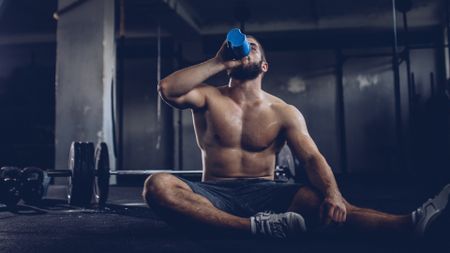 When’s the best time to take creatine?
When’s the best time to take creatine?The science-backed supplement is a must for building strength and muscle, but is there an optimal time to take it?
By Bryony Firth-Bernard Published
-
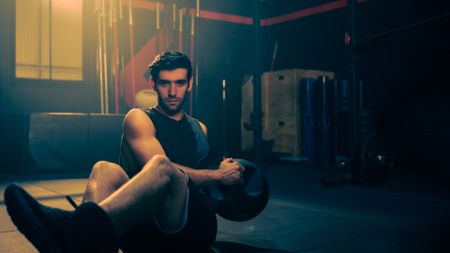 Three overrated core exercises and what you should do instead
Three overrated core exercises and what you should do insteadA fitness expert says these exercises aren’t all they’re cracked up to be
By Bryony Firth-Bernard Published
-
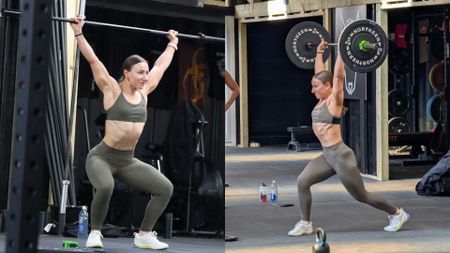 I tried Olympic weightlifting for the first time – here are three things it's taught me
I tried Olympic weightlifting for the first time – here are three things it's taught meBeing strong simply won't cut it
By Bryony Firth-Bernard Published
-
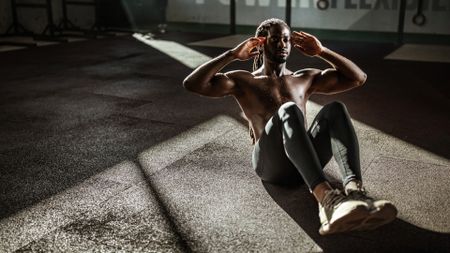 An exercise scientist ranks every ab exercise – and the worst one may surprise you
An exercise scientist ranks every ab exercise – and the worst one may surprise youFYI it’s not crunches or sit-ups
By Bryony Firth-Bernard Published
-
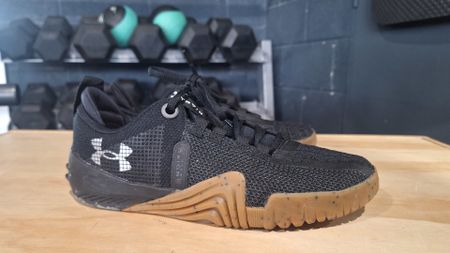 I didn't think Under Armour could improve its top-tier workout shoes – I was wrong
I didn't think Under Armour could improve its top-tier workout shoes – I was wrongThe TriBase Reign 6 has had a complete overhaul, with a flatter sole, improved flexibility and a brand-new look
By Bryony Firth-Bernard Published
-
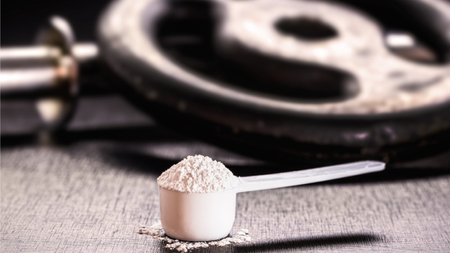 Creatine powder vs pills: which is better for muscle gains?
Creatine powder vs pills: which is better for muscle gains?A sports nutritionist gives the low-down on this popular supplement
By Bryony Firth-Bernard Published
-
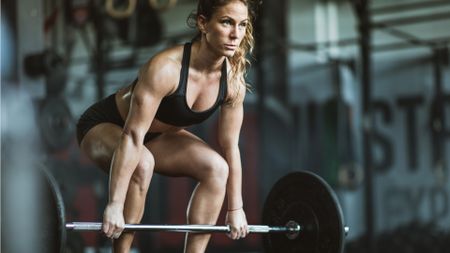 Why the cube method is your best chance to improve strength and avoid muscle-building plateaus
Why the cube method is your best chance to improve strength and avoid muscle-building plateausStruggling to build muscle? This could help
By Lucy Miller Published
-
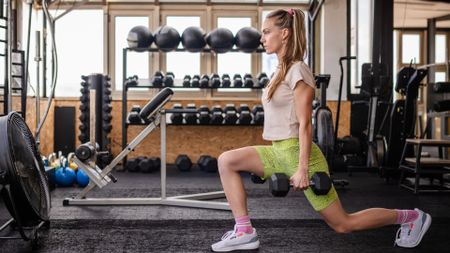 A fitness expert says these are the three best longevity exercises to help you live a more active, longer life
A fitness expert says these are the three best longevity exercises to help you live a more active, longer lifeBy Bryony Firth-Bernard Published
